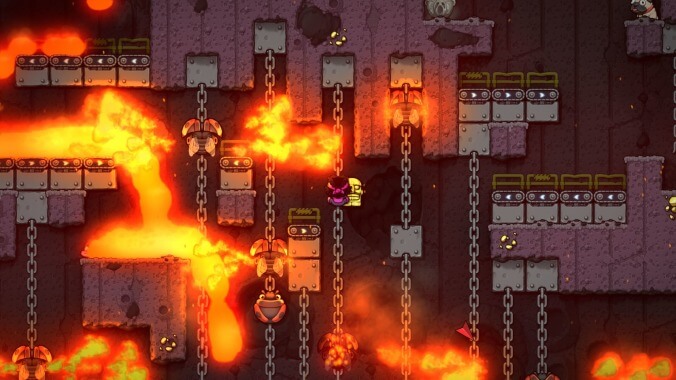Earlier this year (and/or eight million, billion months ago, by the modern reckoning), I posed a question to our readership, asking
“What’s your ideal comfort game?” When crafting this query, I envisioned a warm mitten of a video game, one that helped you through the darkest times, allowed you to traffic in the pleasant and familiar, and just generally soothed your soul. It was a happier question, for (arguably) happier times—but that is not the question that we are tackling today. No, these are not soothing or mitten-y days; as I write this, it’s Wednesday night, Twitter has declared the U.S. president a persistent source of dangerous misinformation, and nobody knows if Dave Chappelle is going to admit that he was full of shit for saying we should give Donald Trump a chance on 2016’s first post-election
SNL. Which is to say: These are
anxiety times, friends. So what’s your anxiety game?
As an on-the-record idle gamer, my immediate and obvious response to this question is the one currently running in the background at this very moment: Synergism, by a one-person development team under the name of Platonic. As with almost every idle game that’s consumed me over the last several years, if you asked me why I was addicted to this particular assemblage of math equations, logical fallacies, and extremely un-shiny visuals, the answer would come as some mixture of self-deprecation and the least flattering aspects of human nature, i.e., “I’m dumb enough to feel good when the numbers go up, and they know it.” And yet, prolonged exposure to this scrotty little genre has allowed me to detect the elegance of Synergism’s design, the smart way it incorporates choice and strategy into the rote business of the steady escalation of digits. (There’s also the fact that the game is currently solely Patreon-supported, with no in-game purchases or outside ads; I can admire the purity of the devotion to obsession.) There’s a philosophy at work here, new mechanics to uncover, a genuine sense of intent and design that belies the supposed simplicity of it all. Given that I’ve spent the last 24 hours staring at election maps, willing static numbers to work themselves into a more acceptable shape, the evenings I’ve spent tweaking my output in Synergism start to feel a lot less futile. At least there, I have some control.
Not that Synergism is the only game I’m taking out my feelings on—or maybe that should be, am using to take my feelings out on myself. I continue to torture myself with Spelunky 2, for instance, which is borderline Sisyphean in the ways it’s willing to kill you, over and over again. (Ironically, the recent roguelike release that actually features Sisyphus as a character hasn’t been able to scratch that same itch, possibly because it’s just to onice.) In addition to all the things about it that are genuinely great—the speed of its movement, the slapstick comedy of its chaos, the amazing sense of discovery it can provoke—Spelunky 2 is also a game for the criminally bloody-minded to cheerfully self-flagellate with. It’s a game you can grind away at, and let it grind away at you, too. Whip, jump, get impaled, repeat. Whip, jump, get shot by an arrow, repeat. Run, jump, get a jetpack, get set on fire, jetpack explodes, you explode… repeat. Sometimes you need a game that’s as relentless and unmerciful as the churning wheels operating in your own brain.
To be clear, this isn’t the only way gaming can address or express anxiety—and certainly not the healthiest. (As a counterpoint, please re-visit this wonderful column from my colleague Shannon Miller, who discussed how Katamari Damacy helped her work out gaming anxieties in a space free of triggering violence, or this essay from Joey Clift about games that foster connection and kindness.) But acknowledging those brighter lights doesn’t stop there from being games that live in the same spaces as the grayest or blackest of moods, the games that exist in some degree to eat time one would rather not spend with oneself. It’s a service, of a sort; sometimes colder comforts are the only ones that soothe.


 Keep scrolling for more great stories from The A.V. Club.
Keep scrolling for more great stories from The A.V. Club.